Before publishing his breakthrough book Bangkok 8, and five later entries in the series, John Burdett lived a life of novel-worthy plot twists among hippies in Europe, the criminal underclass in London, and the Hong Kong elite.
By Jim Algie
Of all the paths that lead to becoming a lawyer, John Burdett chose one of the lesser traveled routes: dropping out of middle-class London life before university to wander across Europe and Morocco on the “hippie trail,” living in the Matala caves on the Greek isle of Crete, hand-carved by lepers a century ago and where folk singer Joni Mitchell once crash-landed and later immortalized in the song “Cary.”
What attracted him to the freewheeling hippie life?
“I had no choice. I lived in north London and my playground was Hampstead Heath. Even before Chelsea became hip kids were smoking dope and dropping acid in Hampstead. I was unusually restrained, a serious scholar, but even so, I was, and perhaps still am, a natural hippy. Then there was the music, a year off, the caves of Matala where a dozen ex-servicemen from Nam all with drug habits camped out, a few bars where you could get smashed on ouzo and retsina for less than a dollar, and Mick Jagger singing, ‘You can’t always get what you want,’ on the café’s jukebox. Like I say, no choice.”
What about the sexual liberation of the “free love” era and women burning their bras in public? Was that overblown?
“It was totally overblown. I lived in the hippest part of London and don’t know of a single woman who burned a bra. The sexual lib was all about late adolescents able to fall in love without the misery of unwanted kids thanks to the pill,” he said.
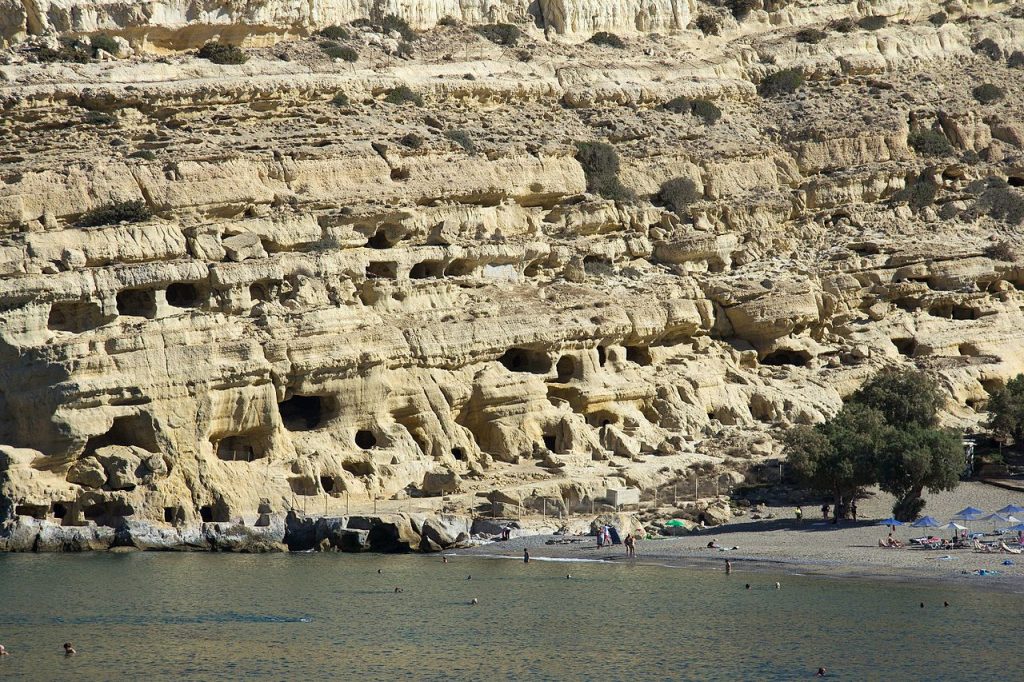
The Matala Caves in Crete where John Burdett and Joni Mitchell both camped out.
After returning from the far-out fringes of the hippie trail John Burdett faced a much more conservative quandary: how to make a living. His first degree in literature only qualified him to read a lot of good books while collecting the dole. So he ended up doing his bar exams, not a law degree, followed by two years of solid cramming and subsistence living that led to another two years of working in a legal center located in a part of Southeast London that John calls “gangster land.” Some of those experiences would inform and inspire his first novel, a legal thriller called A History of Thirst that Publisher’s Weekly summed up thusly, “Former lawyer Burdett’s first novel cleverly exploits a love triangle to highlight the mordant ironies of the British class system.”
By the time that book was published John had already been making huge money in Hong Kong as a corporate lawyer for 12 years, before the British gave the territory back to the Chinese in 1997. That is the backdrop for his second novel, The Last Six Million Seconds, a detective thriller reprinted a few years ago.
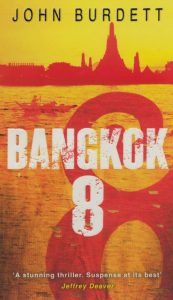
Bangkok 8 was John’s breakout book.
BANGKOK 8
One presumes that the British bankers, captains of industry and Chinese tycoons he took on as clients, and who took him aboard their luxurious yachts for pleasure cruises around Stanley Bay, had no idea they were dealing with a former cave-dwelling hippie who had a penchant for classical literature, a taste for theology and a long-standing affiliation with the counter-culture.
But it was precisely that background and those values that drew him towards Thailand and Buddhism because, “I came to the conclusion that my soul was starving. For me, the extreme materialism of modern times, which has reached a stage of religious fanaticism, has shriveled hearts worldwide. The disease of narcissism is a pandemic for which our ancestors had only one cure: religion. However, as a product of Western education I cannot take gods seriously, especially when one discovers how much they seem to mirror human egotism. In Thailand, about 90 percent of the people are Buddhist. That means they have been brought up to keep self-importance under control and to be generous and useful to others. Though of course I’m aware of the tsunami of problems that seems to be overwhelming the country at this time,” he said.
Originally thinking that he was going to write a crime novel set in Bangkok that revolved around the tourist police, John had to shelve that idea. In the go-go bars and watering holes of Soi Cowboy he discovered “how open the bar girls were about revealing their life stories. From the information they freely gave I was able to build up a picture of a country that, so far as I knew, had never been very well described by Western writers,” said the author, who divides his time between a condo in a Bangkok and a house in rural France, both of which he shares with his Thai wife.
To lend authenticity to the series, a quality often lacking in farang books about Thailand, he began studying Thai. Now, after more than a decade of studying, he has graduated to reading local newspapers in Thai.
Praised and scorned for its depiction of the capital’s seamier side, Bangkok 8 was not the first book of its kind – Christopher Moore had been authoring detective novels set in the capital since the early 1990s and Jack Reynolds penned the ultimate red-light novel “A Woman of Bangkok” way back in the 1950s – but I don’t think any foreign writer has quite captured the sacred and profane aspects of Thailand, and how they rub up against each other on a daily basis, as well as John Burdett has.
The detective hero, Sonchai Jitpleecheep, who is both a devout Buddhist and a fervent pot-smoker, embodies what may seem like contradictions to the Western mindset, but are natural enough in a country of predominantly non-confrontational pacifists with one of the highest murder rates in the world.
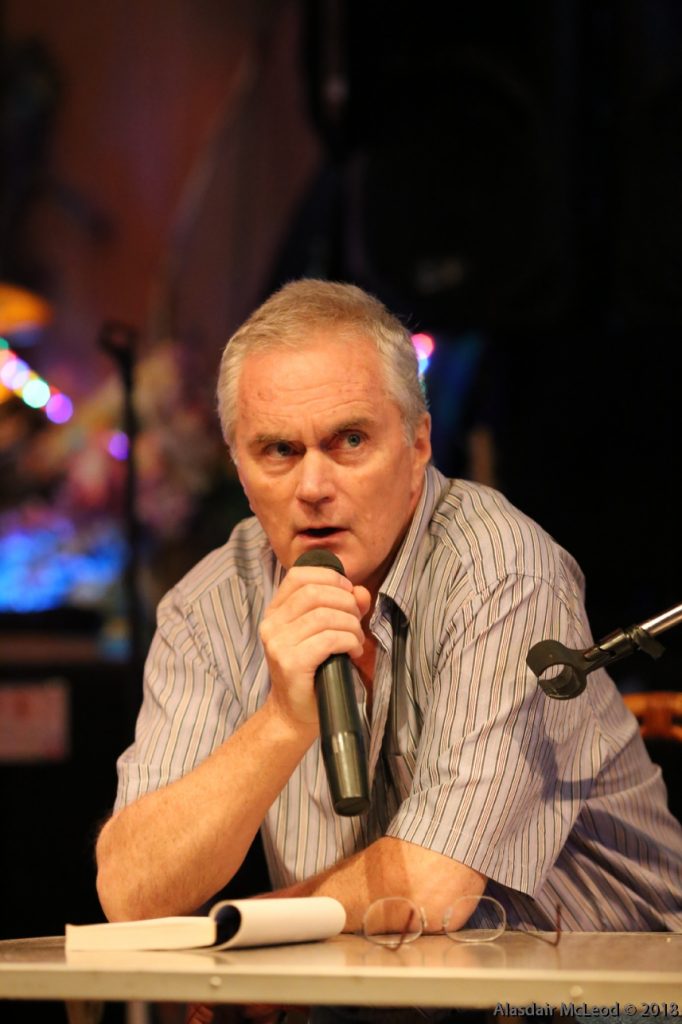
John Burdett talks about the origins of the Bangkok 8 series at the Bangkok Noir night at CheckInn 99 in 2015. (Photo by Alasdair McLeod.)
VULTURE PEAK
The first book in any such series is often the fan favorite, but for me Vulture Peak packs the biggest punch. Set mostly on Phuket and in Hong Kong, the fifth entry in the series takes the flesh trade to its most gruesome extreme: organ trafficking.
Carrying a cargo of 1,764 human eyes worth some US$200,000 dollars, Sonchai flies to Dubai to meet the twin Chinese sisters known in the business as “the Vultures.” When a female character in this series does not like sex, a la the poisonous “Mad Moi” in Bangkok Tattoo, it’s a sure bet she’s headed towards villainess status at a bullet’s speed. Since neither of the Yip sisters enjoy bedroom bodysurfing, but have varnished their prick-tantalizing skills to a porn-image gloss, that means a double shot of “blue balls” for Sonchai, who is already fretting over the possibility that his partner Chanya is having an affair.
Whereas some of the earlier books were more concerned with how Bangkok’s carnal kinks revealed Freudian X-rays of the Western male characters’ libidos and neuroses, Vulture Peak plays much of the commercial sex for sociological value and satire. Perhaps the most academic ex-bargirl ever, Chanya is writing a thesis about the flesh trade and how it liberated her from demeaning menial labour.
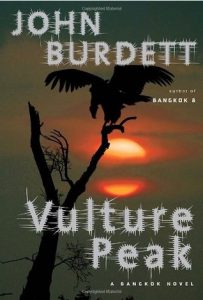
The fifth entry in the series deals with organ trafficking.
These asides are interesting enough, but what makes this book so memorable is the pathos that the author brings to his descriptions of the potential clients desperate for a new heart, or a lung, or a liver. One email that the Yip sisters show Sonchai reads: “I’ve been in pain all my life, I couldn’t have done anything to deserve it because I’ve been too sick since childhood to hurt anyone. I am innocent and I’m forty-two years old and I can’t take it anymore. I don’t care what you have to do. I don’t care who has to die. It’s my turn to live a whole day without pain.”
When an author deals with such extreme material in his books, many people would have to wonder: Isn’t he some kind of degenerate or sex fiend or just plain morbid?
In his case, they would be wrong on all three counts.
Before Hemingway’s bar and restaurant closed down two years ago, I would sometimes have lunch with John there. He was always friendly, polite, humble and good company. Most of the time he preferred talking about other author’s books rather than his own. Harkening back to his hippie roots, he always showed up wearing a plain T-shirt, shorts and sandals, though he was punctual as a lawyer who works for billable hours. In spite of his successful run of bestsellers, which have been translated into more than 20 languages, this is not a man who lives extravagantly.
Like a lot of expats who have lived in Thailand for a while, the Bangkok 8 author smiles and laughs a lot. Perhaps the most British aspect of his character is a dry wit. When I asked what was happening with the sixth book in the series, John said, “I missed my deadline… by about four years.”
He’s a generous guy too.
Back in 2013 when I was getting ready to publish a short-story collection called “The Phantom Lover and Other Thrilling Tales of Thailand,” my publisher in Singapore, Periplus, asked me if we could get a blurb on the front cover from a well-known author. They suggested John. At that point I had only met him once in passing at a talk he did, when I asked him to sign a few copies of his books. So I sent him a polite email. Many authors of his stature would have just ignored it, but John replied in a few hours and said he would be happy to read the PDF and consider writing a blurb.
A week later he sent me a kind email about the book with the following blurb: “Many people write about Thailand these days, but very few have the depth and breadth of Jim Algie. With the persistence of a seasoned journalist and the skill of a born story-teller he takes us places and reveals truths that lesser authors cannot begin to match.”
Which is one of the nicest accolades of my entire writing career.
THE BANGKOK ASSET
Finally published in 2015 after numerous delays and revisions, The Bangkok Asset took the series in a very different direction. The capital’s red-light districts are barely touched. There’s an entire backstory about Sonchai meeting his real father, a Vietnam vet, for the first time. And then there’s the titular titan. Not to give away too many plot details, but in one of the most thrilling scenes in the series, Sonchai witnesses a superhuman feat of strength on the Chao Phraya River one rain-swept morning. This is the Asset in action: a warrior who appears to have been spawned in a lab not in a womb. Behind the scene the Chinese secret police and the CIA are engaged in a game of diplomatic chess with many potential pawns and some serious checkmates.
The novels’ preoccupations with the Vietnam War, with the illegal bombing of Cambodia by the Americans, with psychological warfare and drug experiments, make it John’s homage to and requiem for the counter-culture of the 1960s and early 70s.
Is that a fair summation?
“Yes, the way the world was going, has gone, that era suddenly seemed relevant again. Revisiting it became a compulsion,” said John.
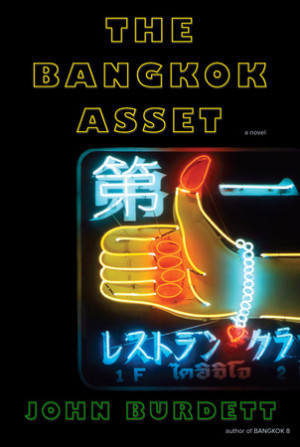
The Bangkok Asset is a modern-day Frankenstein tale with Orwellian overtones.
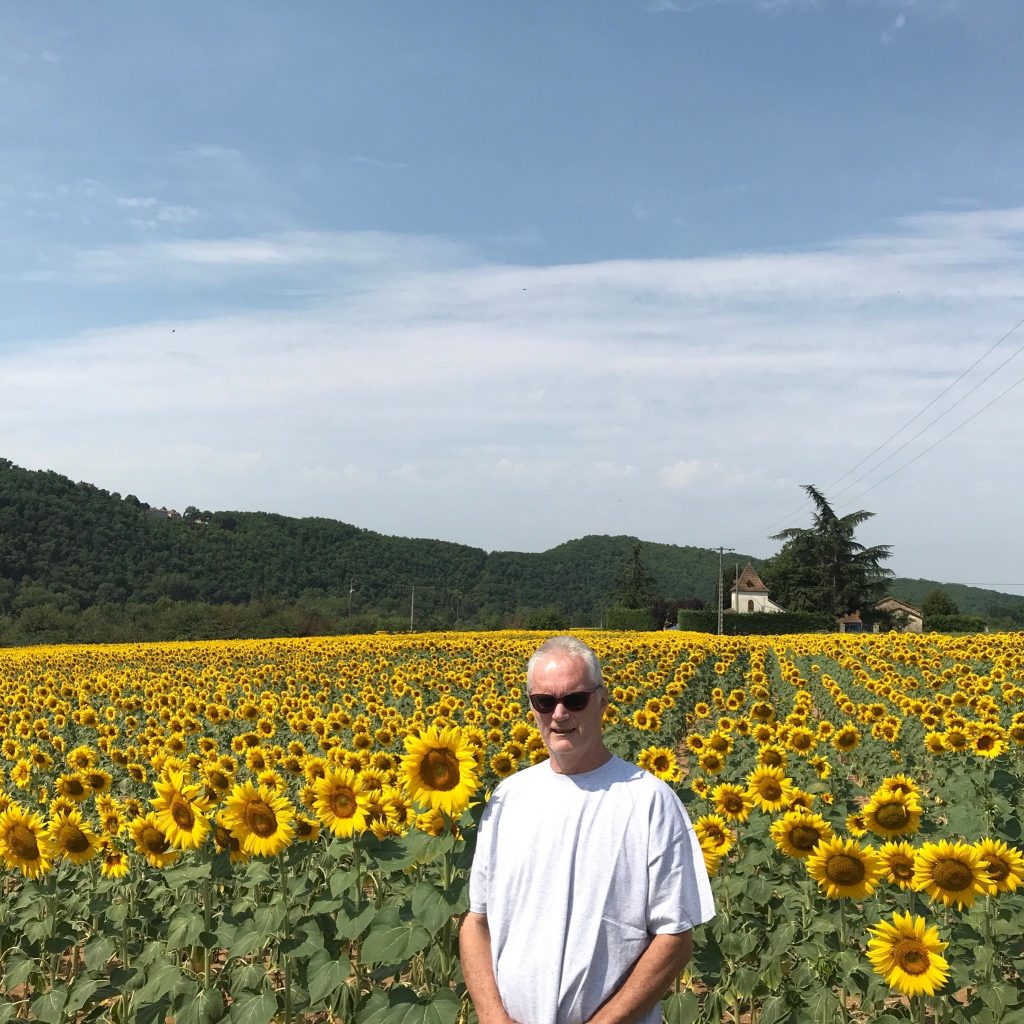
Recent photo of John Burdett near his home in rural France.
Fans of the series may be in for one grand finale, as the Bangkok 8 author is entertaining the idea of writing Sonchai’s memoirs, a la Georges Simenon with his detective hero Maigret.
At the moment, however, his novel-in-progress is a standalone thriller, mostly set in Bangkok, that he calls “quite different” from the previous series.
With so many great true crime shows on TV now, how can a novel possibly compete?
“Good question. I often sit watching and wondering why would anyone read a thriller when these true crime stories are so abundant and usually quite well narrated? My answer is: context. I have eagerly gorged on hundreds of these episodes without once receiving any information at all as to why crimes of extreme violence have suddenly erupted and spread worldwide. In a good dramatic work we end up understanding the villain even if we disapprove, but we do not have a clue about the walking cliché with lurid tattoos and a history of drug abuse who becomes a serial killer or psychopath and who stars in virtually every true crime episode. But supposedly you actually want to think and to know more? Then you need a good novel, because only novelists still believe in thought for the private citizen who wants to make up their own mind.”
Jim Algie’s latest book is the expanded 2018 edition of “On the Night Joey Ramone Died: Tales of Rock and Punk from Bangkok, New York, Cambodia and Norway” that contains a new 130-page section of “Rock Writings and Musical Memoirs,” and a cover blurb from the acclaimed author Timothy Hallinan, “The funniest sad book and the saddest funny book I’ve read in a long time.” The book is available as a paperback or ebook from Amazon.com.
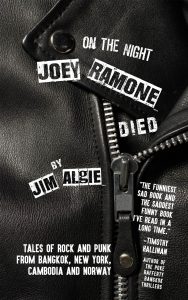
Cover of the revised and expanded 2018 edition.

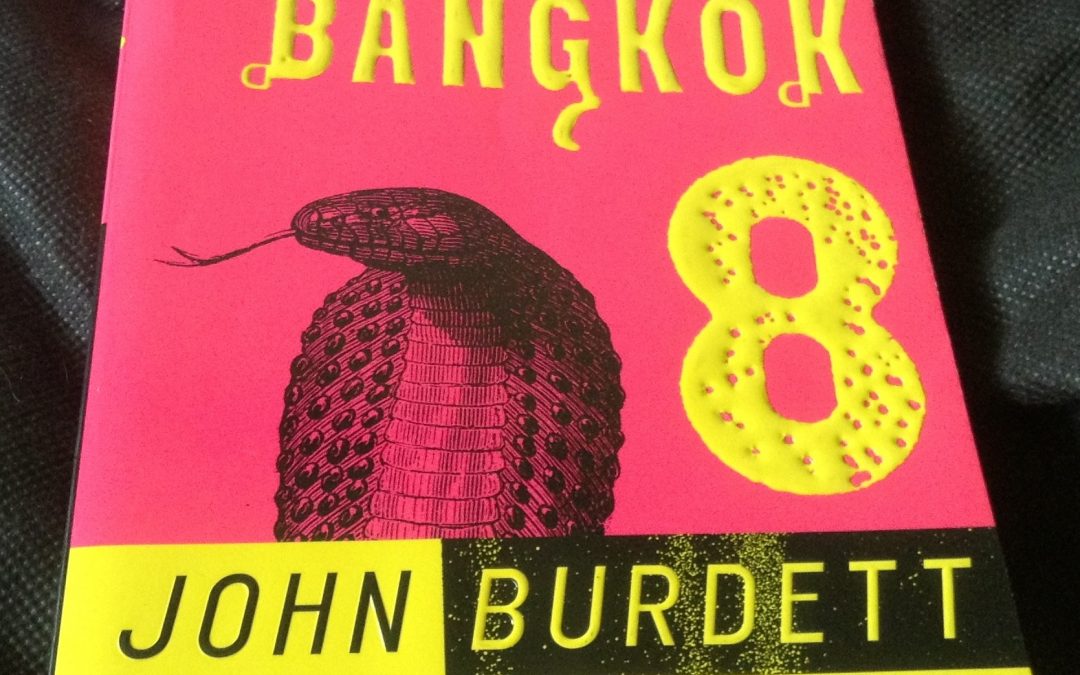
Great review of the first Thai Farang Writer , we do all hope that some inspired movie producer will find some Money and great actors to produce a fantastic series !
That would be great.